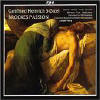Texte paru dans: / Appeared in:
*

Goldberg Magazine # 5 ( 09/1998)
Goldberg a cessé de publier
avec le # 54
~~~~~~
Goldberg is no longer available.
# 54 was the last issue.
Un trésor se cache ici. Gottfried Heinrich Stölzel (1690-1749) est demeuré longtemps dans l'ombre de Bach et de Telemann. Mais si la justice est de ce monde, cet enregistrement de l'un des textes de la Passion profane du début du XVIIIème siècle, pose des jalons pour assurer la réhabilitation légitime du musicien. Composée en 1725, l'oeuvre succède à de nombreuses autres adaptation de la poésie de Barthold Heinrich Brockes, telle celle de Haendel dont l'oeuvre apparaît terne jusqu'à l'insignifiance, comparée à la puissance et à la vivacité immédiate du drame de Stölzel.
Nul doute qu'à part Stölzel lui-même, le champion de cet accomplissement, est le chef d'orchestre Ludger Rémy. Il dirige l'oeuvre avec une conviction brûlante et passionnée qui exprime le lyrisme sans limite du livret. Il sait transmettre son engagement à l'ensemble de l'orchestre, aux choeurs, au superbe plateau des solistes. Chacun, individuellement, répond comme si sa propre vie en dépendait. Dans cette chronique brêve, il est difficile de suivre chaque interprète. Je ne peux m'empêcher de mentionner le magnifique Jésus de Klaus Mertens, noble et digne (la mort du Christ, émouvante et humaine) ; le magnifique engagement vocal de Herman Voss, un alto qui est, au moins l'égal du si réputé Andreas Scholl.
La Brockes Passion de Stölzel est un chef-d'oeuvre enflammé.
Cet interprétation splendidement enregistrée, virtuellement sans fautes,
mérite les rayonnages de toute collection de musique baroque.
BRIAN ROBINS
There is hidden treasure here. Gottfried Heinrich Stölzel (1690-1749) has
long lain in the shadow of Bach and Telemann, but if there is any justice
this recording of his setting of one of the popular passion texts of the
early 18th century will go far toward effecting long overdue recognition.
Composed in 1725, it follows in the wake of a number of other versions of
the poetry of Barthold Heinrich Brockes, most notably that of Handel, whose
comparitively second-rate work pales into near insignificance when set
beside the power and vivid immediacy of Stölzel's great drama.
There is absolutely no doubt that apart from Stölzel himself the hero of the undertaking is conductor Rémy, who directs the work with a loving and burning sense of conviction which totally compliments the unbounded verbal enthusiasm he expresses in the booklet. His utter commitment to the piece has equally obviously communicated itself to his forces, every one of whom from orchestra and chorus to the superb line-up of soloists responds as if their life depended upon it. In the course of a short notice it is obviously invidious to call attention to individuals, but I cannot resist mentioning the magnificent Jesus of bass Klaus Mertens, not only noble and dignified but bringing a movingly human element to his portrayal of Christ's suffering, and also the magnificent singing of Henning Voss, an alto at least the equal of the much-hyped Andreas Scholl.
Stölzel's Brockes Passion is a blazing masterpiece. This
splendidly recorded and virtually flawless performance demands a place in
every collection of Baroque music.
BRIAN ROBINS